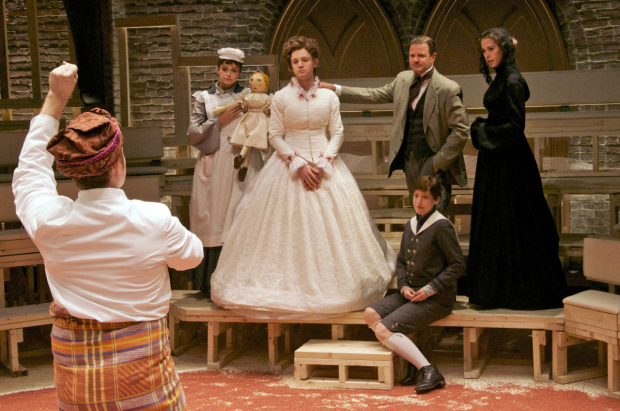Cloud Nine

(© Doug Hamilton)
Atlantic Theater Company has been transformed into a wooden O for the revival of Caryl Churchill's Cloud Nine. Spectators on raised platforms surround the stage as the company portrays archetypal characters from England's past. Then they all switch roles for the second act, which leaps over time and space in a manner reminiscent of Shakespeare. Hearkening back to the epic style of the master of English drama turns out to be a perfect choice for this play about the tectonic shifts in British society over the last century. Cloud Nine brilliantly charts the life and death of a global superpower — a cautionary tale Americans would be wise to heed.
The first act takes place when the British Empire is at its zenith. Clive (Clarke Thorell) is a colonial administrator living with his family in Africa. His wife, Betty (Chris Perfetti), oversees a household that includes her mother Maud (a wonderfully dry Lucy Owen), her son Edward (Brooke Bloom), and her daughter Victoria (a crude doll the adults toss around the stage). Governess Ellen (Izzie Steele) helps raise the children while black servant/spy Joshua (Sean Dugan) reports directly to Clive. The arrival of explorer Harry Bagley (John Sanders) and widow Mrs. Saunders (Steele) upends the family's delicate routine, exposing the cracks in their portrait of Victorian propriety.
As we discover, an undercurrent of sex and longing persists throughout the first act. Gabriel Berry tells this story with his gorgeous period costumes: A menagerie of buttons, belts, and other accessories of bondage serve to mask a world of hot sexual desire. As the most powerful figure onstage, Clive is the least subtle about it (Thorell luxuriates in his character's gleeful hypocrisy). His dominance is less about Christian morality than it is about political stability. Churchill bluntly asserts the connection between an oppressive patriarchy and colonialism. "Through our father we love our queen and our God," Clive admonishes his fay son, who will one day be expected to be just as domineering as dear old dad.
The fanciful casting of a woman as Edward brilliantly draws out the performativity of gender. Bloom is not just playing peter pan, but a little boy with girlish tendencies that must be squashed to maintain heterosexual male dominance. Similarly, Perfetti's Betty seems the most feminine of all the ladies onstage (while simultaneously betraying a certain unease with this kabuki). No one seems quite comfortable in their own skin.
And speaking of skin: If gender is all just a performance, what about race? Dugan (a white actor) deftly navigates the potential minefield that is Joshua. He's not performing "blackness" the same way Perfetti performs femininity, but instead embodies the Victorian ideal of a domestic servant: He's like something straight out of Downton Abbey. This adds another layer to the social theater in which we all participate and that Churchill shrewdly satirizes.
In 1979, the year in which act two takes place (and the year Cloud Nine debuted with Joint Stock Theatre Group), the somewhat ridiculous Victorian wonderland of act one must have seemed like a strange dream (or nightmare) for most Britons. By then the empire had collapsed and the U.K. had been reduced to a regional power, forced to go hat-in-hand to the I.M.F. for a bailout in 1976.
In Churchill's telling, this humiliation has coincided with radical changes for our central family who, like vampires, have only aged 25 years over the course of the preceding century. Baby Victoria (Owen) now dabbles in bisexuality with girlfriend Lin (Izzie Steele). Victoria's husband, Martin (Sanders), is a committed feminist and therefore fully supportive of such polyamory. Edward (Perfetti) decidedly identifies as gay, although he also sleeps with women. Even stalwart Betty (Bloom, smacking of Princess Margaret) is considering leaving her husband. These are not the straitlaced Victorians we first encountered.
Under the sensitive and surefooted direction of James Macdonald, Cloud Nine offers a smart social critique that transcends time. This play could easily be a facile exercise of modern theater folk sneering back at a shameful past. Instead, the shame extends easily into the 20th century and beyond.
That's true on so many levels with Sanders' sharp portrayal of Martin. Despite his gung-ho feminism, traces of male chauvinism linger in his bloviating: "I'm writing a novel about women from the women's point of view," he proudly shares. And while progressive off-Broadway audiences should appreciate Martin's open-mindedness, there's just something pathetic about the sight of him reclining on the green and reading Women, Resistance, & Revolution as his wife cavorts with her new lesbian lover. Is this really the paradise the liberationists of the 1960s promised us? At very least, most of the adults in act two are guilty of child neglect: Running around the stage unaccompanied is Lin's daughter Cathy (a hilarious Thorell). Victoria's son Tommy is invisible, suggesting just how important he is to his self-involved parents.
Viewing Cloud Nine in 2015 proves a huge amount of prescience on Churchill's part: Not only did she identity the height of British hegemony in act one, she pinpointed rock bottom in act two. It should surprise no one that, just months after the world premiere of Cloud Nine, voters overwhelmingly rejected this brave new Britain of postcolonial liberation, ushering in the resurgent conservatism of Margaret Thatcher (Ronald Reagan would follow in this country a year later). We still feel the consequences of that political legacy, and the ones that followed, as we quickly approach yet another social turning point. Cloud Nine suggests that we should proceed with caution, utopian ideals firmly in check.











